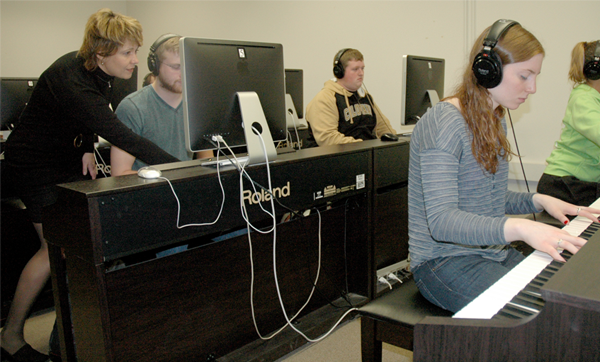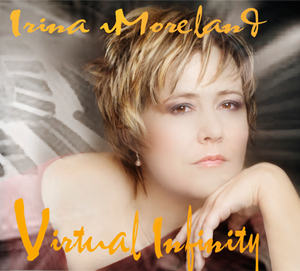Five questions for Irina Moreland
As coordinator of the Piano Lab at the University of Colorado Denver College of Arts and Media, instructor Irina Moreland faced a significant challenge: how to modernize a facility that technology had left behind – and do it without a significant funding source. Working with David Dynak, dean of CAM, and Frank Jermance, then the department chair of Music and Entertainment Industry Studies, she helped lead a transformation last summer that has reinvigorated the lab.
Moreland credits innovative approaches by past and current leadership at the school, including current Department Chair Sam McGuire, with making the reinvented lab a reality.
The process began when the Rockley Foundation, which has long supplied pianos for use on the campus, was asked if it were possible for it to provide higher-end keyboards with USB ports enabling computer interface. Rockley agreed. Next, Jermance learned of a computer lab that was going offline and whose computers would typically be repurposed for faculty or student use. Instead, he secured the used Apple Macs for the Piano Lab. The creative approach enabled a relatively inexpensive makeover that otherwise would have cost tens of thousands of dollars.
“Millennial piano students are typically very adept at using modern technology,” Moreland says. “To maintain student interest, modern tools were needed. I observed other universities in the state with better laboratories and was motivated to bring this innovative idea of the lab to a competitive educational level.”
A classically trained pianist and mother of two teenagers, Moreland recently released a CD of “crossover classical/rock and electronic, built on a bedrock of classical music treasures.” (To hear samples of tracks from her CD and music that student Ruben Garcia created in the Piano Lab, click on the links at the conclusion of this story.)
1. How did you first become interested in music instruction?
My mother, a graduate of Moscow Conservatory, was my main inspiration. Music was the environment into which I was born and has been a lifelong love of mine. Only for a brief time as a teenager did I question that music performance and instruction was not what I was meant to do. I frequently toured in the early stages of my artistic life, especially when I was in Russia.
While a doctoral student at CU-Boulder, I developed a commitment to teaching, in addition to performance. After earning my doctorate, I gradually switched my focus toward teaching. However, I still perform in the Denver area and internationally on occasion. I love teaching and inspiring my students, who in turn are very informative and helpful concerning my main research at the moment, which is how technology is and will affect the performing arts.
2. As someone who has performed around the world, what’s an example of something that Americans can teach the rest of the world about music, and what can we learn from the rest of the world?
Americans bring innovation in music style, performance and the technology of presentation. I believe that the next, transformative wave will be the development of integrated systems of software, hardware and infrastructure allowing performers and audiences to see and react to each other across distances and time zones, in settings creating the intimacy of presence. I’m calling the concept the “Arts Plex.”
What the world brings to America is multigenerational, multicultural music traditions – exposure to world and Western music inspire and stimulate music in America. Jazz, the blues, and other recent genres like rap and hip-hop, all have ties to traditions brought from elsewhere.
3. How has technology changed the way music students learn, and the way you teach them?
When I arrived at UCD, my initial assignments were music history and music appreciation. Instruction methodology was text-book based with assigned readings, instructor lecture and, aside from CD-based “listenings,” minimal use of audio-visual resources.
I quickly realized that utilization of technology to optimize knowledge transfer and meet student expectations was required. Use of PowerPoint presentations, “Blackboard” posted readings in lieu of textbooks, the Internet, YouTube, digital testing, email, texting, IM and other electronic media swiftly became the norm. Student response was very positive, and sometimes the learning experience was more on my side than the students’, as individual students leapt forward to provide suggestions and expertise.
Naturally, when the opportunity arose to similarly assess how to revitalize the Piano Lab, I worked with the department, especially with the singer-songwriting group and recording arts team, to assess the appropriate mix of technology and infrastructure upgrades required to re-establish the Piano Lab as a primary instructional resource of the College of Arts and Media. A primary goal was to ensure those changes excited student interest and involvement. Selections of instruments, firmware and software were critical. The key was selecting instructional and creative software that was user-friendly, relevant and productive for the students, and readily usable by faculty. In addition, I would like not to destroy established traditions of the teaching piano approach, but at the same time to bring innovative and contemporary aspects to it.
4. How have students and faculty reacted to the lab’s improvements?
Student response has been extremely positive and inspirational, so much so that the department quickly realized that resources to provide “open hours” were needed. Not only have traditional users used the lab, but there’s demand from faculty, singer-songwriter majors and non-performance majors. Success has put a strain on the lab’s availability. As an example, in spring 2011, a single section for non-performance students was offered, with seven taking the course. In fall 2011, two sections were filled, with 15 students each. For spring 2012, a single section only is offered, because demand for the lab is exceeding the ability to schedule it. A second section for non-performance students is under discussion, since that demand has not diminished, either.
Faculty reaction has focused on the practical aspects of implementation, training, establishment of curriculum, etc. The Piano Lab is both a tool and a workplace, and its revitalization impacts many aspects of instruction.
5. How do you see technology evolving in music education – and higher education in general – in the coming years?
Instruction and performance in the performing arts are the epitome of traditional, person-to-person knowledge transfer. However, academic instructional methodologies utilizing web-based course tools and the computing “cloud” are enabling distance teaching through e-learning and m-learning, which in turn, imperils the foundations of brick-and-mortar institutions. Equally concerning may be the rise of the “Mega Lecturer.” Once technology enables students (consumers) to purchase online, live-lecturer events, competition may swiftly consolidate the body of lecturers presently replicated with widely disparate skill and knowledge levels across the full run of academic institutions, to the acclaimed, relatively few, teacher/performers.
Push-back and survival will mean providing services that big-box institutions cannot provide. Key tools will remain intimacy of instruction, the warmth of collegial halls and human connections, and the creation of an educational experience with room for innovation and experimental thought. The ultimate goal of the student must be the ultimate goal of the institution – to provide an individual with the technical, thinking and performance skills to be successful in a difficult world.
Audio



